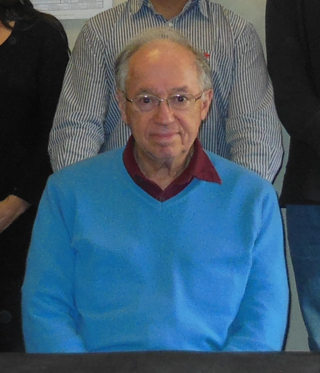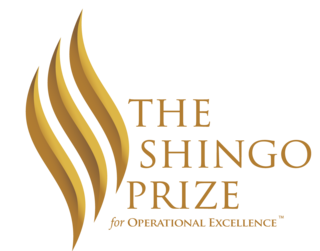
Lean manufacturing is a method of manufacturing goods aimed primarily at reducing times within the production system as well as response times from suppliers and customers. It is closely related to another concept called just-in-time manufacturing. Just-in-time manufacturing tries to match production to demand by only supplying goods that have been ordered and focus on efficiency, productivity, and reduction of "wastes" for the producer and supplier of goods. Lean manufacturing adopts the just-in-time approach and additionally focuses on reducing cycle, flow, and throughput times by further eliminating activities that do not add any value for the customer. Lean manufacturing also involves people who work outside of the manufacturing process, such as in marketing and customer service.
The Toyota Production System (TPS) is an integrated socio-technical system, developed by Toyota, that comprises its management philosophy and practices. The TPS is a management system that organizes manufacturing and logistics for the automobile manufacturer, including interaction with suppliers and customers. The system is a major precursor of the more generic "lean manufacturing". Taiichi Ohno and Eiji Toyoda, Japanese industrial engineers, developed the system between 1948 and 1975.

Shigeo Shingo was a Japanese industrial engineer who was considered as the world’s leading expert on manufacturing practices and the Toyota Production System.
Muda is a Japanese word meaning "futility", "uselessness", or "wastefulness", and is a key concept in lean process thinking such as in the Toyota Production System (TPS), denoting one of three types of deviation from optimal allocation of resources. The other types are known by the Japanese terms mura ("unevenness") and muri ("overload"). Waste in this context refers to the wasting of time or resources rather than wasteful by-products and should not be confused with waste reduction.
Single-minute digit exchange of die (SMED) is one of the many lean production methods for reducing inefficiencies in a manufacturing process. It provides a rapid and efficient way of converting a manufacturing process from running the current product to running the next product. This is key to reducing production lot sizes, and reducing uneven flow (Mura), production loss, and output variability.

Ohno Taiichi was a Japanese industrial engineer and businessman. He is considered to be the father of the Toyota Production System, which inspired Lean Manufacturing in the U.S. He devised the seven wastes as part of this system. He wrote several books about the system, including Toyota Production System: Beyond Large-Scale Production.
Operational excellence is a mindset that embraces certain principles and tools to create a culture of excellence within an organization. Operational excellence means every employee can see, deliver, and improve the flow of value to a customer.

Value-stream mapping, also known as material- and information-flow mapping, is a lean-management method for analyzing the current state and designing a future state for the series of events that take a product or service from the beginning of the specific process until it reaches the customer. A value stream map is a visual tool that displays all critical steps in a specific process and easily quantifies the time and volume taken at each stage. Value stream maps show the flow of both materials and information as they progress through the process.

Norman Bodek was a teacher, consultant, author and publisher who published over 100 Japanese management books in English, including the works of Taiichi Ohno and Dr. Shigeo Shingo. He taught a course on "The Best of Japanese Management Practices" at Portland State University. Bodek created the Shingo Prize with Dr. Vern Beuhler at Utah State University. He was elected to Industry Week's Manufacturing Hall of Fame and founded Productivity Press. He was also the President of PCS Press. He died on December 9, 2020, at the age of 88.
Lean IT is the extension of lean manufacturing and lean services principles to the development and management of information technology (IT) products and services. Its central concern, applied in the context of IT, is the elimination of waste, where waste is work that adds no value to a product or service.

Industrial engineering is an engineering profession that is concerned with the optimization of complex processes, systems, or organizations by developing, improving and implementing integrated systems of people, money, knowledge, information and equipment. Industrial engineering is central to manufacturing operations.

Subir Chowdhury is a Bangladeshi-American author of 15 books and noted for his work in quality and management. He is currently the chairman and CEO of ASI Consulting Group, LLC, in Bingham Farms, Michigan.

Toyota Kata is a management book by Mike Rother. The book explains the Improvement Kata and Coaching Kata, which are a means for making the continual improvement process as observed at the Toyota Production System teachable.
The P-Course is a practical training program about Industrial Engineering implemented to teach the main techniques for industrial work improvement. Although especially aimed at applications in manufacturing, it can be useful also to transfer the core concepts of systematic improvement approach to people involved in operational activities in non-manufacturing businesses.
Design for lean manufacturing is a process for applying lean concepts to the design phase of a system, such as a complex product or process. The term describes methods of design in lean manufacturing companies as part of the study of Japanese industry by the Massachusetts Institute of Technology. At the time of the study, the Japanese automakers were outperforming the American counterparts in speed, resources used in design, and design quality. Conventional mass-production design focuses primarily on product functions and manufacturing costs; however, design for lean manufacturing systematically widens the design equation to include all factors that will determine a product's success across its entire value stream and life-cycle. One goal is to reduce waste and maximize value, and other goals include improving the quality of the design and the reducing the time to achieve the final solution. The method has been used in architecture, healthcare, product development, processes design, information technology systems, and even to create lean business models. It relies on the definition and optimization of values coupled with the prevention of wastes before they enter the system. Design for lean manufacturing is system design.
Gwendolyn Galsworth is an American President and Founder of Visual Thinking Inc and also an author, researcher, teacher, consultant, publisher and leader in the field of visuality in the workplace and visual management. Her books have won multiple Shingo Prize awards in the Research and Professional Publication category, focusing on conceptualizing and codifying workplace visuality into a single, comprehensive framework of knowledge and know-how called the "visual workplace."

The Shingo Prize for Operational Excellence is an award for operational excellence given to organizations worldwide by the Shingo Institute, part of the Jon M. Huntsman School of Business at Utah State University in Logan, Utah. In order to be selected as a recipient of the Shingo Prize, an organization "challenges" or applies for the award by first submitting an achievement report that provides data about recent business improvements and accomplishments and then undergoing an onsite audit performed by Shingo Institute examiners. Organizations are scored relative to how closely their culture matches the ideal as defined by the Shingo Model™. Organizations that meet the criteria are awarded the Shingo Prize. Other awards include the Shingo Silver Medallion, the Shingo Bronze Medallion, the Research Award, and the Publication Award.
Patricia Anne Gabow is an American academic physician, medical researcher, healthcare executive, author and lecturer. Specializing in nephrology, she joined the department of medicine, division of renal diseases, at the University of Colorado School of Medicine in 1973, advancing to a full professorship in 1987; she is presently Professor Emerita. She was the principal investigator on the National Institutes of Health Human Polycystic Kidney Disease research grant, which ran from 1985 to 1999, and defined the clinical manifestations and genetics of the disease in adults and children.
Daniel T. Jones is an English author and researcher. He won the Shingo Prize for Operational Excellence in the Research and Professional Publication category multiple times for his books The Machine that Changed the World, Lean Thinking: Banish Waste and Create Wealth in Your Organization and Seeing the Whole: Mapping the Extended Value Stream.

Steven J. Spear is a Senior Lecturer at MIT's Sloan School of Management and Senior Fellow at the Institute for Healthcare Improvement. As a Researcher and Author, he is the recipient of the McKinsey Award and five Shingo Prizes. His book, The High Velocity Edge, won both the Shingo Prize for Excellence in Manufacturing Research and Philip Crosby Medal from the American Society for Quality (ASQ).









